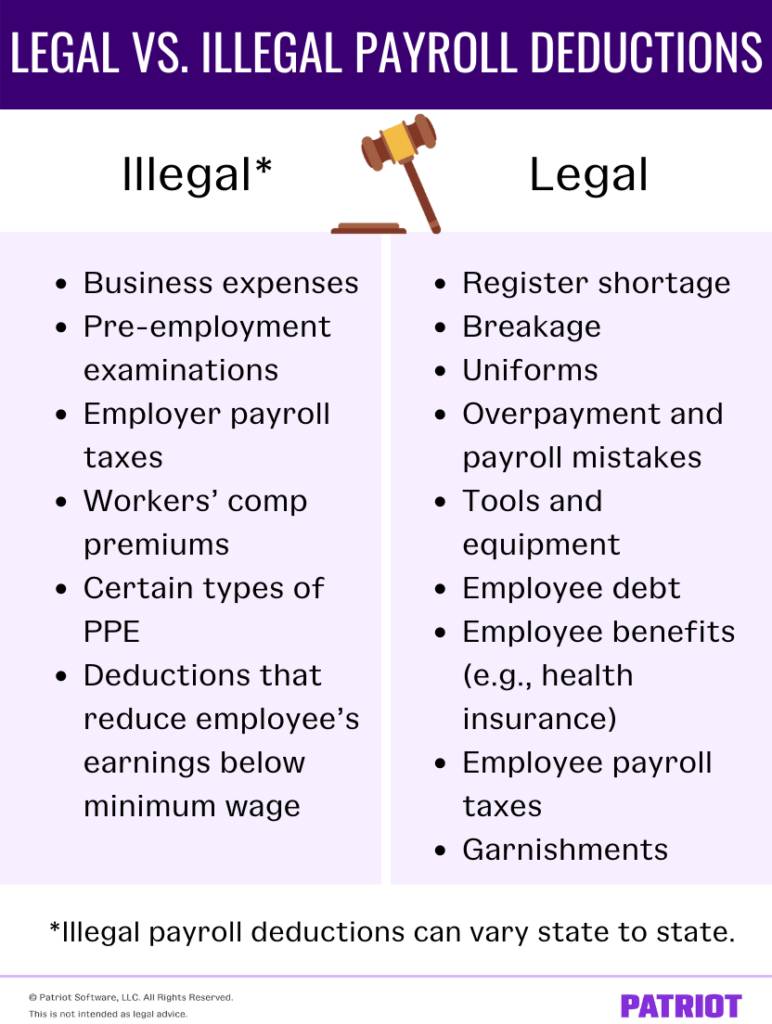Part of being an employer means running payroll. And chances are, you probably have to deal with a few types of payroll deductions, like 401(k) or health insurance, when paying employees. But, what happens when you have to deal with a deduction that you don’t have consent for, like a correction for a payroll error? What can you deduct from an employee’s paycheck? Get the scoop on legal vs. illegal payroll deductions to avoid making a mistake that could wind up costing you.
6 Reasons you may need to deduct additional money from employees’ paychecks
Are employers allowed to deduct money from wages for cash shortages? What about uniforms? There are a number of reasons why you may need to deduct pay from employee wages. But, is it legal to do?
Let’s break down six reasons why you may need to deduct additional wages from an employee’s paycheck and whether you can deduct them from an employee’s pay legally.
1. Payroll mistakes
Payroll mistakes happen to even the most seasoned employers. When running payroll, you may:
- Miscalculate payroll taxes
- Use incorrect tax rates
- Not include a deduction
A payroll mistake may mean that you need to collect additional wages from employees to correct said mistake.
Can employers deduct pay for mistakes? Yes, employers can fix payroll mistakes on future paychecks thanks to rules in place by state laws and the Fair Labor Standards Act (FLSA).
If you made a mistake, own up to it and come up with a resolution with your employee. The last thing you want to do is catch them off guard and collect more money from their pay when they aren’t expecting it.
2. Overpayment
Overpayment and payroll mistakes go hand in hand. You may accidentally overpay an employee if you:
- Don’t accurately calculate taxes
- Pay an employee for too many hours
- Misenter information in your payroll
When it comes to overpayment, you have to correct the issue. But, is it legal to do it? The short answer: yes. The long answer? State labor laws and the FLSA give employers the right to recover an overpayment. However, before you initiate a recovery, check your state’s laws. Some states only allow you to collect overpayments based on the type of error that you make (e.g., mathematical error).
To avoid any disgruntled employees or issues, you can discuss the mistake with your employee, work out a solution, and receive their consent.
3. Employee debt
Occasionally, your employee may owe you a debt. For example, your employee may ask you for an advance. And at some point, you need to recollect that cash in some way or another.
So, can you collect employee debt on paychecks? Yes. With employer loans, like a salary advance, you can withhold money from your employee’s paycheck to pay yourself back (even if it falls below minimum wage). But like with other expenses, it’s best to work out some type of agreement with your employees before you collect money in the first place.
If you plan on giving an advance to an employee or letting them borrow funds for a different reason, make sure you have a policy in place. And to avoid any legal issues, have the employee sign an agreement to pay back the borrowed amount. In the agreement, include the date, amount borrowed, and how and when employees must repay it.
Keep in mind that some states may follow different rules. For example, a state may prohibit paycheck deductions for debts or have other requirements. Check state laws before agreeing to let an employee borrow money.
4. Register shortages and breakage
Let’s face it: mistakes happen. Your employees aren’t perfect, and neither are you. So, you can expect an employee to make a mistake every once in a while (they’re only human, after all!). But, can employer dock pay for mistakes, like register shortages and breakage?
Under federal law, if an employee breaks an item or their cash register is short, you can charge them for these losses. However, you can only do so if the employee is still earning minimum wage after the deduction.
Although federal law allows it, some states may have different rules on whether you can deduct shortages and breakage from an employee’s paycheck. For example, your state may require you to get the employee’s consent before deducting the loss. And, some states may not allow you to deduct for these losses at all.
Before you take any money out of a paycheck without consent, do your research to find out your state’s rules.
5. Uniforms
Depending on your type of business, you may require employees to wear uniforms while working. Sure, uniforms may be part of the job. But, are you allowed to deduct uniform fees from employees’ wages?
Federal law allows employers to deduct the cost of supplying and maintaining uniforms. For example, you can deduct the costs for cleaning and pressing an employee’s uniform. But there’s one small catch: The employee’s wages can’t fall below minimum wage after the deduction.
If an employee makes minimum wage, the employer cannot require the employee to pay for a uniform through deductions or other methods (including overtime).
6. Tools and equipment
For some roles, an employee may need specific tools or equipment to get the job done. But, can you force employees to pay for these things and take it from their pay? Like with uniforms, the answer all depends on if the employee meets minimum wage requirements.
Under the FLSA, employers can charge employees for equipment and tools. However, the employer must pay for the equipment if the expense causes the employee’s earnings after deductions to drop below the minimum wage.
Types of illegal payroll deductions
Now that we’ve gone over a few possible scenarios and whether you can deduct them from an employee’s paycheck, let’s take a look at a few types of illegal deductions from wages.
When paying an employee, do not deduct the following costs:
- Business expenses
- Pre-employment examinations (e.g., medical or physical)
- Employer-only payroll taxes
- Workers’ compensation premiums
- Certain types of personal protective equipment
- Deductions that reduce employee’s earnings below minimum wage
As an employer, it’s oh-so-important to know what you can and cannot deduct from employee wages. So, do your homework (and keep this article handy) to ensure you know the illegal payroll deductions like the back of your hand.

Legal payroll deductions
To briefly recap, let’s go over a few legal payroll deductions. Keep in mind that these deductions are legal under federal law. However, state laws can vary.
Here are some legal payroll deductions under federal law:
- Register shortage
- Breakage
- Uniforms
- Overpayment and payroll mistakes
- Tools and equipment
- Employee debt
- Employee benefits (e.g., health insurance)
- Employee payroll taxes
- Garnishments
Legal vs. illegal deductions: The bottom line
When it comes to an employer taking money out of paycheck without consent, it all boils down to a few things:
- If the deduction is considered illegal
- FLSA rules
- State rules
In short, deduction-related rules can vary depending on what it is and your location. If you’re unsure about whether or not you can deduct something from an employee’s pay, look at FLSA rules and consult your state, too.
Many deduction rules can vary state by state. For example, breakages and cash shortages are considered illegal deductions in New York.
Before you deduct anything from an employee’s wages, do your research to know what you can and cannot legally deduct. You may even consult a small business lawyer to help. And to ensure you have employees’ consent ahead of time for legal deductions (e.g., uniforms), consider having employees sign an acknowledgment form when you hire them.
Need a simple and affordable way to track payroll deductions, taxes, and more? Patriot’s online payroll software has you covered. Running payroll with Patriot is a quick and easy three-step process, making it a breeze to pay employees and manage deductions. Try it free for 30 days today!
This is not intended as legal advice; for more information, please click here.



